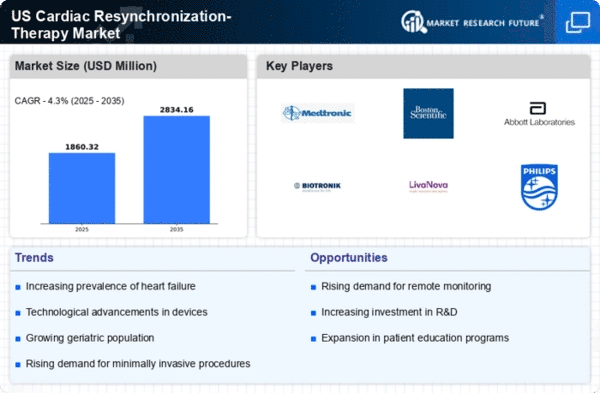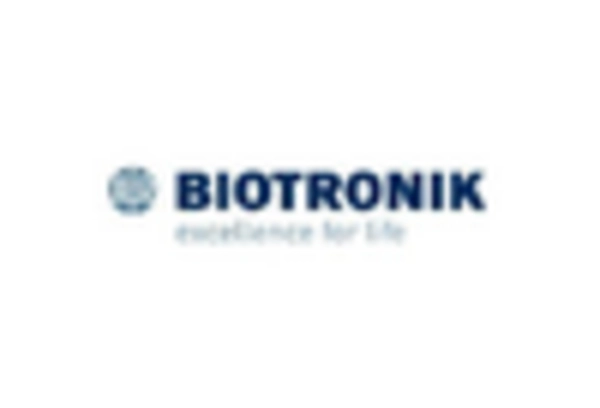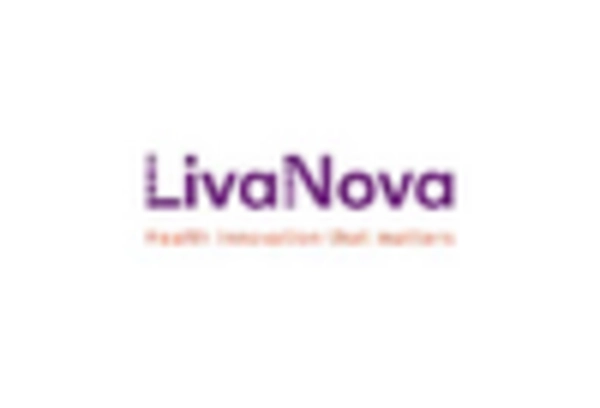Growing Geriatric Population
The increasing geriatric population in the US is a significant driver for the cardiac resynchronization-therapy market. As individuals age, the risk of developing cardiovascular diseases, including heart failure, escalates. The US Census Bureau projects that by 2030, all baby boomers will be over 65 years old, leading to a substantial rise in the number of older adults requiring advanced cardiac care. This demographic shift necessitates the implementation of effective treatment options, such as Cardiac Resynchronization Therapy, which has been shown to improve heart function and overall health in elderly patients. Consequently, healthcare systems are likely to prioritize the adoption of these therapies to meet the needs of the aging population, thereby fostering growth in the cardiac resynchronization-therapy market.
Increased Awareness and Education
There is a growing awareness regarding heart diseases and the benefits of cardiac resynchronization therapy among both healthcare professionals and patients. Educational initiatives by medical organizations and advocacy groups have significantly contributed to this awareness. As patients become more informed about their treatment options, they are more likely to seek out therapies that can improve their quality of life. This trend is reflected in the rising number of patients being referred for cardiac resynchronization therapy, which has been associated with improved clinical outcomes. Furthermore, healthcare providers are increasingly recognizing the importance of discussing advanced therapies with their patients, leading to a higher adoption rate of cardiac resynchronization-therapy solutions. This heightened awareness is expected to continue driving market growth in the coming years.
Supportive Reimbursement Policies
Reimbursement policies in the US are becoming increasingly favorable for cardiac resynchronization therapy, which is a significant driver for the market. Insurance providers are recognizing the clinical benefits of these therapies and are more willing to cover the costs associated with their implantation and follow-up care. This shift in reimbursement practices is crucial, as it alleviates the financial burden on patients and encourages healthcare providers to recommend cardiac resynchronization therapy as a viable treatment option. The Centers for Medicare & Medicaid Services (CMS) have also established guidelines that support the use of these therapies in eligible patients, further enhancing access. As reimbursement policies continue to evolve positively, the cardiac resynchronization-therapy market is likely to experience sustained growth.
Advancements in Medical Technology
Technological advancements play a crucial role in shaping the cardiac resynchronization-therapy market. Innovations in device design, such as smaller and more efficient implantable devices, have enhanced the effectiveness and safety of cardiac resynchronization therapy. For instance, the introduction of leadless pacemakers and advanced algorithms for device programming has improved patient outcomes and reduced complications. The market is also witnessing the integration of remote monitoring technologies, allowing for better management of patients post-therapy. As these technologies continue to evolve, they are likely to attract more healthcare providers to adopt cardiac resynchronization-therapy solutions, thus driving market expansion. The overall investment in research and development within this sector is expected to yield further advancements, enhancing the appeal of cardiac resynchronization therapy.
Rising Prevalence of Heart Failure
The increasing incidence of heart failure in the US is a primary driver for the Cardiac Resynchronization-Therapy market. According to the American Heart Association, approximately 6.2 million adults in the US are living with heart failure, a number that is projected to rise as the population ages. This growing patient population necessitates advanced treatment options, including cardiac resynchronization therapy, which has been shown to improve outcomes in patients with heart failure. The demand for effective therapies is further fueled by the aging demographic, as older adults are more susceptible to heart conditions. Consequently, healthcare providers are increasingly adopting cardiac resynchronization-therapy solutions to address this pressing health issue, thereby propelling market growth.
















